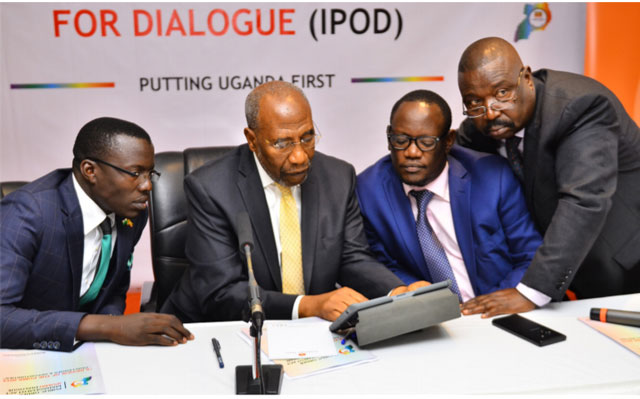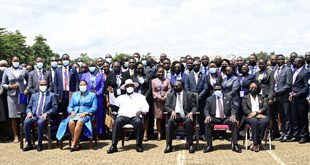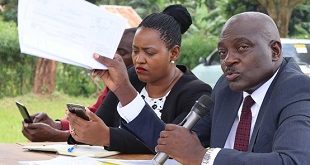
Kampala, Uganda | THE INDEPENDENT | Political parties through the Inter-Party Organisation for Dialogue (IPOD) have drafted a proposal which calls for individuals seeking to contest as independents to resign from political parties 12 months before elections.
Candidates who contest and lose in political parties will thus be blocked from contesting as independents. The proposal has garnered unanimous support among political parties. It will be presented to political parties’ leaders at IPOD summit next week.
IPOD is an umbrella of political parties with representation in parliament. These include the ruling National Resistance Movement (NRM), the Democratic Party (DP) Forum for Democratic Change (FDC), Uganda Peoples’ Congress (UPC) and Justice Forum (JEEMA).
The proposal seeks to actualise article 72(5) of the constitution as amended in 2005 that mandated parliament to “by law regulate the manner of participation in (elections) and financing of elections by individuals seeking political office as independent candidates.”
The proposal is also seemingly an attempt by political parties to fight the Administration of Parliament Amendment Bill 2018. The bill, among other things, seeks to create a position for “commissioner of independent MPs.” This bill was rejected by political parties in unison.
Democratic Party Secretary General-cum-Chairperson of IPOD council says political parties recognise independent MPs. The spirit of the draft regulations, he says isn’t to fight independent MPs but to make them truly independent and strengthen parties.
Uganda Peoples’ Congress Secretary General, Fred Ebil argues that the regulation will end confusion and divisions that candidates plant in political parties when they run as independents.
“We want to avoid people who go and contest in primaries, and they go ahead to contest as independents and they cause confusion in parties and take away members,” he said. “We want to make it hard for people who are spoiling us.”
Ebil says political parties are also broaching means of dealing with defiant MPs who fail to toe party lines. FDC and NRM have been victims of this dilemma.
A number of FDC MPs thought to be sympathetic or backing former party president, Mugisha Muntu have since 2017 when Muntu was defeated by Patrick Amuriat Oboi refused to walk the party line.
Muntu and some of his stalwarts exited FDC last year and have birthed a new political party, Alliance for National Transformation (ANT).
There are 69 independent MPs in the 10th parliament. Most of them are leaning to political parties which they ditched to run as independent candidates in 2016 general elections or thereafter. There is fear that this number will increase in 2021 if their pathways aren’t locked up.
President Museveni, during last year-December IPOD inaugural summit, argued that taming errant MPs will strengthen multi-party governance in Uganda. Museveni said he support strengthening of political parties to recall MPs who defy them.
He said article 83 of the constitution which provides for the tenure of MPs was wrongly drafted.
NRM in 2014 attempted to eject the rebel MPs-Theodore Ssekikubo (Lwemiyaga), Wilfred Niwagaba (Ndorwa East), Mohammad Nsereko (Kampala Central) and Barnabas Tinkasimire (Buyaga East)-from parliament after expelling them from the party. The litigation went up to Supreme Court which ruled that MPs cannot lose seats if expelled from their political parties.
IPOD council has also drafted a proposal to change modalities for funding political parties to be discussed at next week’s summit. Political parties currently receive minimal funding from consolidated fund through Electoral Commission. This funding is shared through numerical strength. Opposition political parties have cried foul that almost all the funding is taken by the ruling party.
A new proposal will ensure that all political parties get a uniform “administration fund” for running offices and party activities such as organising delegates’ conferences. And then the remaining percentage is shared on numerical strength.
UPC’s Ebil says they want funding that can at least run political parties from headquarters to grassroots level. “For the betterment of democracy, political parties should be funded.
That is what we are saying.” “Funding is a key way through which parties can grow. We are discouraged from getting foreign funding. We need funding through an act of parliament, not state patronage,” he says.
Ebil says the “how much question” has not been discussed. He says it will be discussed after next summit if political party leaders agree to the proposed formula. “We can’t talk of figures right now because we want to first agree on the spirit, the format and figures will come later,” he says.
*****
URN
 The Independent Uganda: You get the Truth we Pay the Price
The Independent Uganda: You get the Truth we Pay the Price



I used to be suggested this website by way of my cousin. I am no longer positive whether this put up is
written through him as nobody else recognise such unique about my problem.
You are amazing! Thanks!